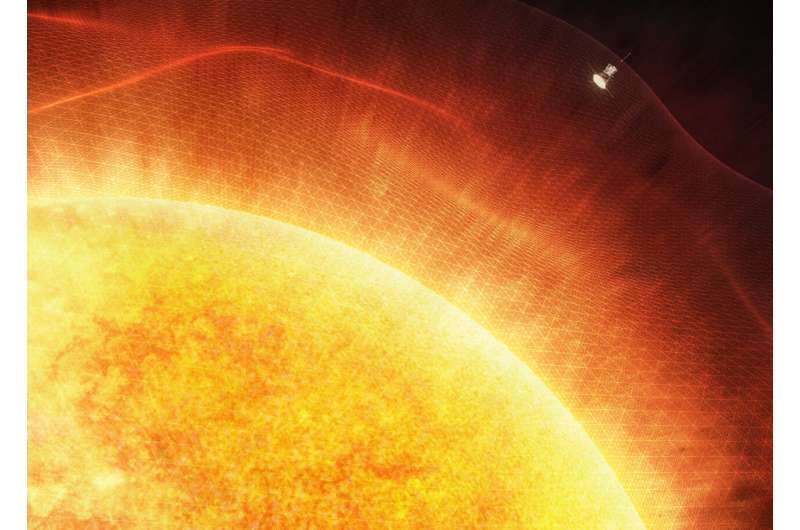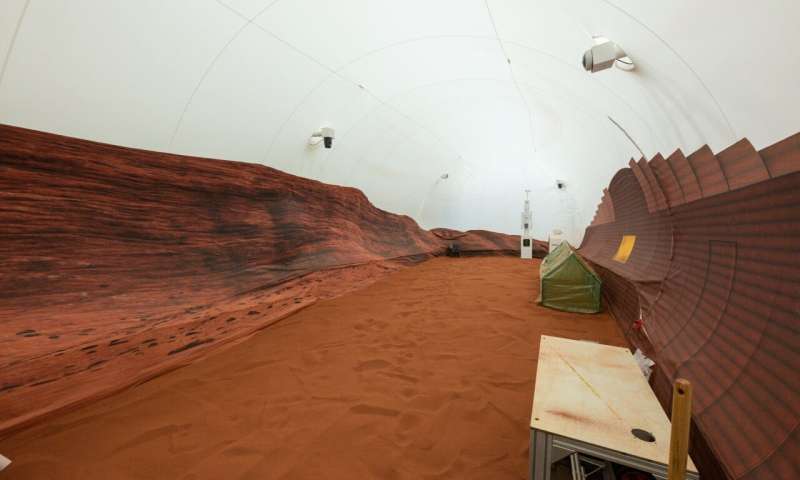Hawaii observatories play criical role adding color to new space mission
Wednesday, 05 July 2023 09:27 Observing billions of galaxies across more than a third of the sky and building a 3D map of the universe are all part of the Euclid mission that the European Space Agency launched with its Euclid satellite from Cape Canaveral, Florida. Euclid's dataset is getting a big helping hand from observations taken at three observatories in Hawaii.
The Euclid satellite mission will spend more than s
Observing billions of galaxies across more than a third of the sky and building a 3D map of the universe are all part of the Euclid mission that the European Space Agency launched with its Euclid satellite from Cape Canaveral, Florida. Euclid's dataset is getting a big helping hand from observations taken at three observatories in Hawaii.
The Euclid satellite mission will spend more than s Lockheed Martin targets small businesses via Next Generation Interceptor
Wednesday, 05 July 2023 09:27 Lockheed Martin, under the banner of its Next Generation Interceptor (NGI) program, has collaborated with three small businesses to foster growth within the defense industrial sector. This initiative is part of the Department of Defense (DoD) Mentor-Protege Program that facilitates prime contractors to function as mentors, enhancing the business and technical acumen of small businesses.
Th
Lockheed Martin, under the banner of its Next Generation Interceptor (NGI) program, has collaborated with three small businesses to foster growth within the defense industrial sector. This initiative is part of the Department of Defense (DoD) Mentor-Protege Program that facilitates prime contractors to function as mentors, enhancing the business and technical acumen of small businesses.
Th Regulatory uncertainty as commercial human spaceflight takes off
Wednesday, 05 July 2023 08:00
As two companies prepare to begin or resume commercial suborbital human spaceflights, they are facing uncertainty about how the safety of the people on those flights will be regulated.
Unfavourable weather delays final Ariane 5 launch
Tuesday, 04 July 2023 09:00 The farewell flight of Europe's workhorse Ariane 5 rocket, scheduled for Tuesday, has been postponed for 24 hours due to bad weather, operator Arianespace said.
The 117th and final flight of an Ariane 5 rocket, after 27 years of launches, had been due to take off between 2130 and 2305 GMT from Europe's spaceport in Kourou, French Guiana.
"Due to unfavourable winds at high altitude above
The farewell flight of Europe's workhorse Ariane 5 rocket, scheduled for Tuesday, has been postponed for 24 hours due to bad weather, operator Arianespace said.
The 117th and final flight of an Ariane 5 rocket, after 27 years of launches, had been due to take off between 2130 and 2305 GMT from Europe's spaceport in Kourou, French Guiana.
"Due to unfavourable winds at high altitude above ISRO terminates hot test for semi-cryogenic engine midway
Tuesday, 04 July 2023 09:00 The Indian Space Research Organisation (ISRO) recently experienced a hiccup in their semi-cryogenic engine development project. A scheduled hot test was halted midway due to unexpected engine performance.
On July 1, 2023, ISRO revealed that it had initiated the inaugural hot test on an intermediate configuration of the semi-cryogenic engine, designated as Power Head Test Article (PHTA). Th
The Indian Space Research Organisation (ISRO) recently experienced a hiccup in their semi-cryogenic engine development project. A scheduled hot test was halted midway due to unexpected engine performance.
On July 1, 2023, ISRO revealed that it had initiated the inaugural hot test on an intermediate configuration of the semi-cryogenic engine, designated as Power Head Test Article (PHTA). Th Quasar 'clocks' show Universe was five times slower soon after the Big Bang
Tuesday, 04 July 2023 09:00 Scientists have for the first time observed the early universe running in extreme slow motion, unlocking one of the mysteries of Einstein's expanding universe.
Einstein's general theory of relativity means that we should observe the distant - and hence ancient - universe running much slower than the present day. However, peering back that far in time has proven elusive. Scientists have now
Scientists have for the first time observed the early universe running in extreme slow motion, unlocking one of the mysteries of Einstein's expanding universe.
Einstein's general theory of relativity means that we should observe the distant - and hence ancient - universe running much slower than the present day. However, peering back that far in time has proven elusive. Scientists have now SmartSat CRC Pledges $7M for Autonomous AI Spacecraft Development
Tuesday, 04 July 2023 09:00 The three-year project, Spacecraft Autonomy and Onboard AI for Next Generation Space Systems, known as SCARLET-a, will bring together eight SmartSat partners: Airbus, Asension, Deakin University, Defence Science and Technology Group, Leonardo Australia, Saab Australia, Swinburne University of Technology, and University of South Australia (UniSA) in a collaborative research effort.
SCARLET-
The three-year project, Spacecraft Autonomy and Onboard AI for Next Generation Space Systems, known as SCARLET-a, will bring together eight SmartSat partners: Airbus, Asension, Deakin University, Defence Science and Technology Group, Leonardo Australia, Saab Australia, Swinburne University of Technology, and University of South Australia (UniSA) in a collaborative research effort.
SCARLET- Satellites offer enhanced early warning systems for disaster-prone Asian communities
Tuesday, 04 July 2023 09:00 Findings from a recent study underscore the potential for satellite-based early warning systems to bolster evacuation protocols in certain Asian communities. Published on April 27, 2023, in the Emergency Management Science and Technology journal, the study highlights the limitations of conventional ground-based telecommunication systems in regions such as Bangladesh, Bhutan, and Mongolia.
Findings from a recent study underscore the potential for satellite-based early warning systems to bolster evacuation protocols in certain Asian communities. Published on April 27, 2023, in the Emergency Management Science and Technology journal, the study highlights the limitations of conventional ground-based telecommunication systems in regions such as Bangladesh, Bhutan, and Mongolia. Chinese private space company to launch latest rocket in 2024
Tuesday, 04 July 2023 09:00 In the vanguard of the rapidly evolving commercial space industry, Beijing-based private firm Space Pioneer plans the inaugural launch of its TL 3 carrier rocket in 2024. The launch will signify an ambitious stride toward fortifying China's presence in the commercial space launch market.
As reported in an exclusive interview with China Daily, Kang Yonglai, founder and chairman of Space Pio
In the vanguard of the rapidly evolving commercial space industry, Beijing-based private firm Space Pioneer plans the inaugural launch of its TL 3 carrier rocket in 2024. The launch will signify an ambitious stride toward fortifying China's presence in the commercial space launch market.
As reported in an exclusive interview with China Daily, Kang Yonglai, founder and chairman of Space Pio Unfavorable weather delays final Ariane 5 launch
Tuesday, 04 July 2023 06:57
The farewell flight of Europe's workhorse Ariane 5 rocket, scheduled for Tuesday, has been postponed for 24 hours due to bad weather, operator Arianespace said.
The 117th and final flight of an Ariane 5 rocket, after 27 years of launches, had been due to take off between 2130 and 2305 GMT from Europe's spaceport in Kourou, French Guiana.
"Due to unfavorable winds at high altitude above the Guiana Space Centre, Arianespace decided not to start the final phase of the launch preparation operations," the French firm said.
The nearest launch window was now between 2200 and 2305 GMT on Wednesday "if weather conditions are favorable", it added.
The final flight of an Ariane, whose launches have punctuated life in Kourou for nearly three decades, was originally scheduled for June 16.
It was postponed the day before because of problems with pyrotechnical lines in the rocket's booster. The lines have since been replaced.
The final payload on an Ariane 5 is a French military communications satellite and a German communications satellite.
The arrival in 1996 of the Ariane 5, which was able to carry a far bigger load than its predecessor Ariane 4, allowed Europe to establish itself in the communication satellite market.
Ariane 5 flight VA261: weather delays launch
Tuesday, 04 July 2023 06:45
Europe’s Ariane 5 rocket is being prepared for its final launch, following the replacement of pyrotechnical transmission lines which delayed its earlier scheduled liftoff. Due to unfavourable weather Flight VA261 will now lift off no earlier than 5 July at 23:00 BST/00:00 CEST, pending suitable conditions for launch. You can follow live on ESA Web TV; transmission starts 30 minutes before earliest liftoff time.
NASA's Parker Solar Probe completes 16th close approach to the sun
Monday, 03 July 2023 19:17
NASA's Parker Solar Probe accomplished a milestone on June 27, 2023—its 16th orbit of the sun. This included a close approach to the sun (known as perihelion) on June 22, 2023, where the spacecraft came within 5.3 million miles of the solar surface while moving at 364,610 miles per hour. The spacecraft emerged from the solar flyby healthy and operating normally.
On Aug. 21, 2023, Parker Solar Probe will swing past Venus for its sixth flyby of the planet. To prepare for a smooth course, the mission team at the Johns Hopkins Applied Physics Laboratory (APL) applied a small trajectory correction maneuver on June 7, 2023, the first course correction since March 2022.
This flyby will be the sixth of seven planned flybys of Venus during Parker's primary mission. Parker uses Venus's gravity to tighten its orbit around the sun and set up a future perihelion at just 4.5 million miles from the sun's surface.
NASA locks four crew members into a one-year mission in a simulated Mars habitat
Monday, 03 July 2023 16:44
On June 25, 2023, a crew of four volunteers entered a simulated Martian habitat, from which they will not emerge for over a year. Their mission: to learn more about the logistics—and the human psychology—of living long-term on another planet, without ever leaving the ground.
The mission is called CHAPEA (Crew Health and Performance Exploration Analog) and is the first of three planned simulations between now and 2026, each of which will teach scientists progressively more about what it takes for long-duration human spaceflight to succeed.
CHAPEA is based at NASA's Johnson Space Center in Houston, Texas. The habitat, called Mars Dune Alpha, is a 1,700 square-foot 3D-printed living space, in which the crew will live, work, exercise, sleep, and perform experiments.
Through the magic of virtual reality, the mission will also involve extra vehicular activities (EVAs), in which crew members will briefly leave their habitat to enter an adjacent enclosure complete with red sand.
Alone in a dark cave: What can we learn from extreme survival experiments?
Monday, 03 July 2023 15:58
Why do humans undertake journeys of personal exploration, or subject themselves to challenging conditions for long periods of time? What might we learn from their experiences?
British mountaineer George Mallory undertook his fatal attempt to summit Mount Everest in 1924 simply "because it's there". While such quests may have deeply personal motivations, research carried out during expeditions in extreme conditions can contribute to our understanding of how humans respond to environmental challenges.
The research outcomes can potentially be applied to a variety of settings, including remote locations here on Earth and even human space exploration.
Searching for extreme environments
Many explorers seek out "extreme environments." This term describes harsh and unusual environmental conditions where it is difficult for life forms like humans to survive and thrive.
Examples include places that experience extremes of temperature, pressure, altitude, rainfall, breathable air, natural light, or hazardous chemical concentrations.
In recent years, humans have undertaken many extreme experiments, either alone or in groups.
In June 2023, Joseph Dituri, a biomedical engineer at the University of South Florida, completed a record-breaking 100 days living 9.15 meters underwater in a special habitat.
Hawai'i observatories add color, depth to European Euclid mission
Monday, 03 July 2023 15:19
Launched on July 1, 2023, the European Euclid mission will observe billions of galaxies over one-third of the sky to create a map of the Universe. But Euclid's map will be in black and white; telescopes in Hawai'i, including the Subaru Telescope, are needed to determine the colors of the galaxies. The color data will be used to deduce the distance, thus creating a 3D map, uncovering the mysteries of dark matter and dark energy.
The European Space Agency (ESA) Euclid space telescope mission will explore the mysteries of dark matter, dark energy, and cosmic evolution.
